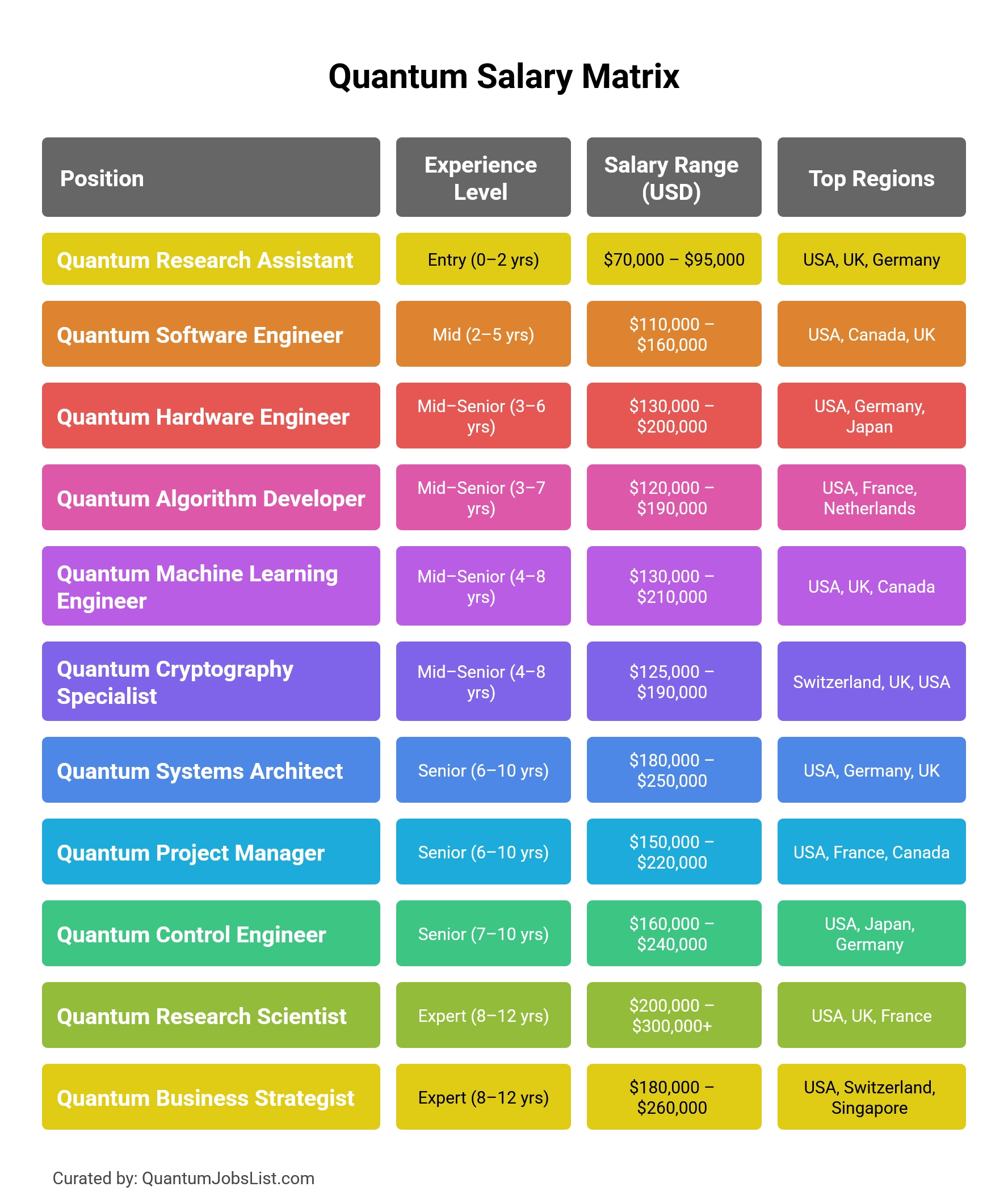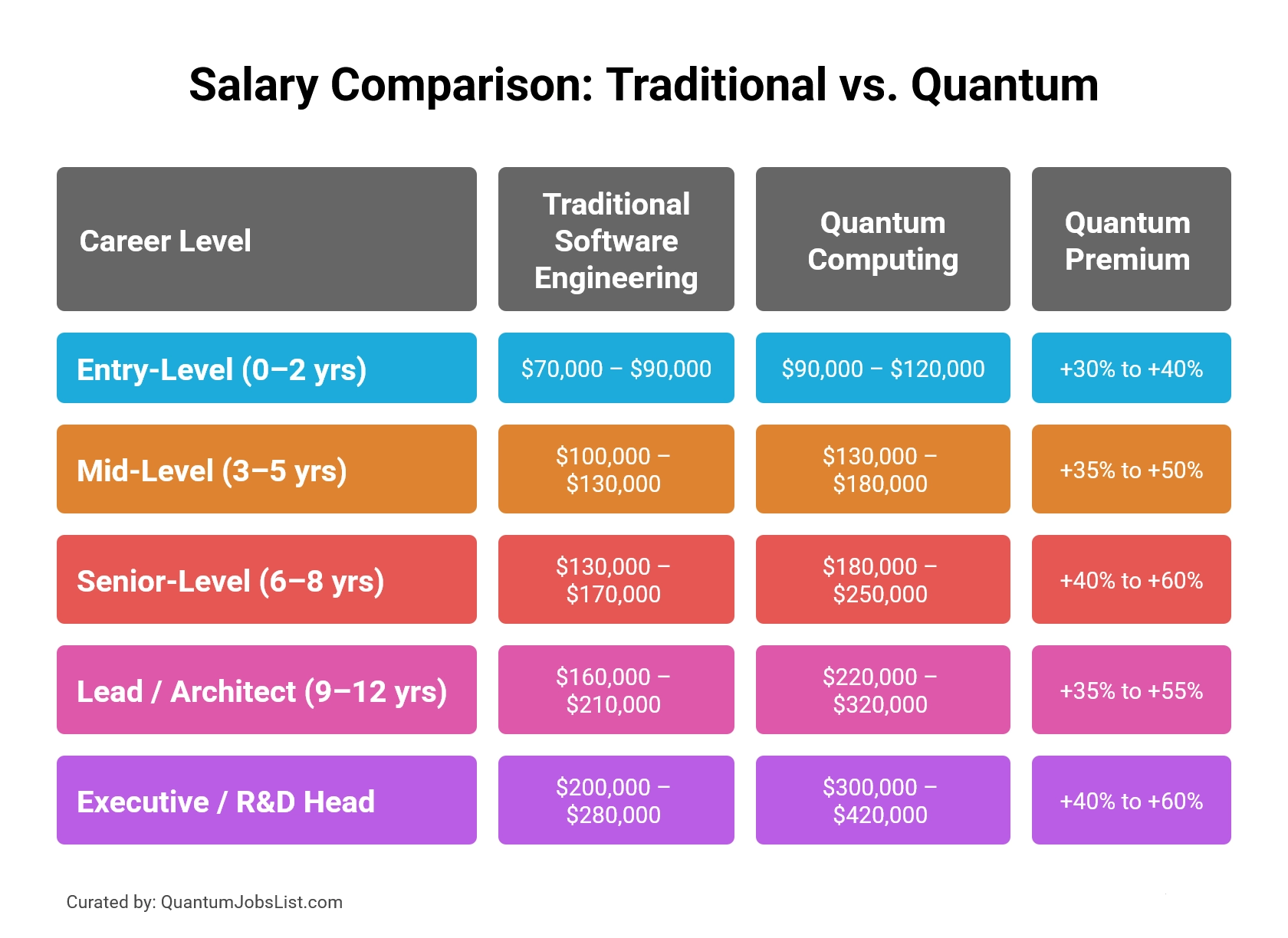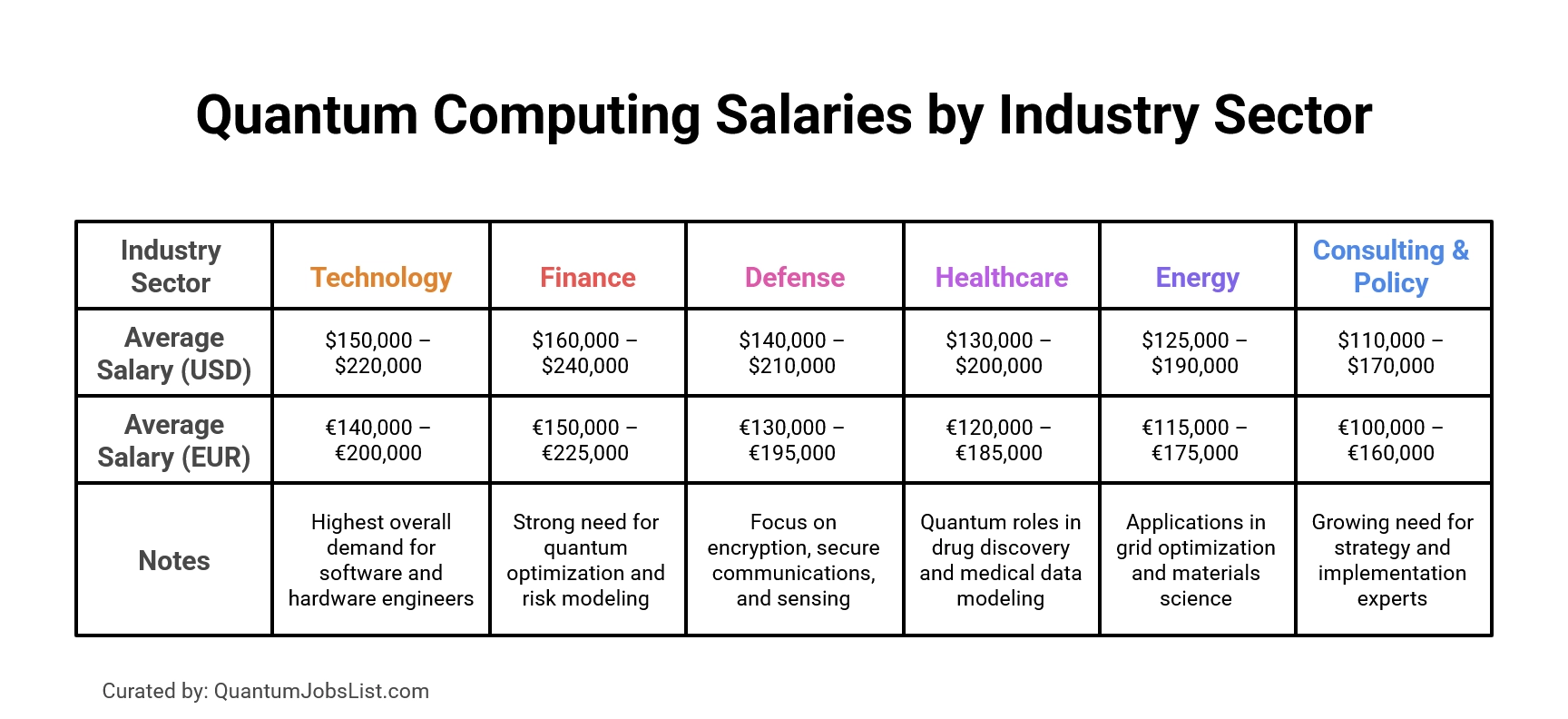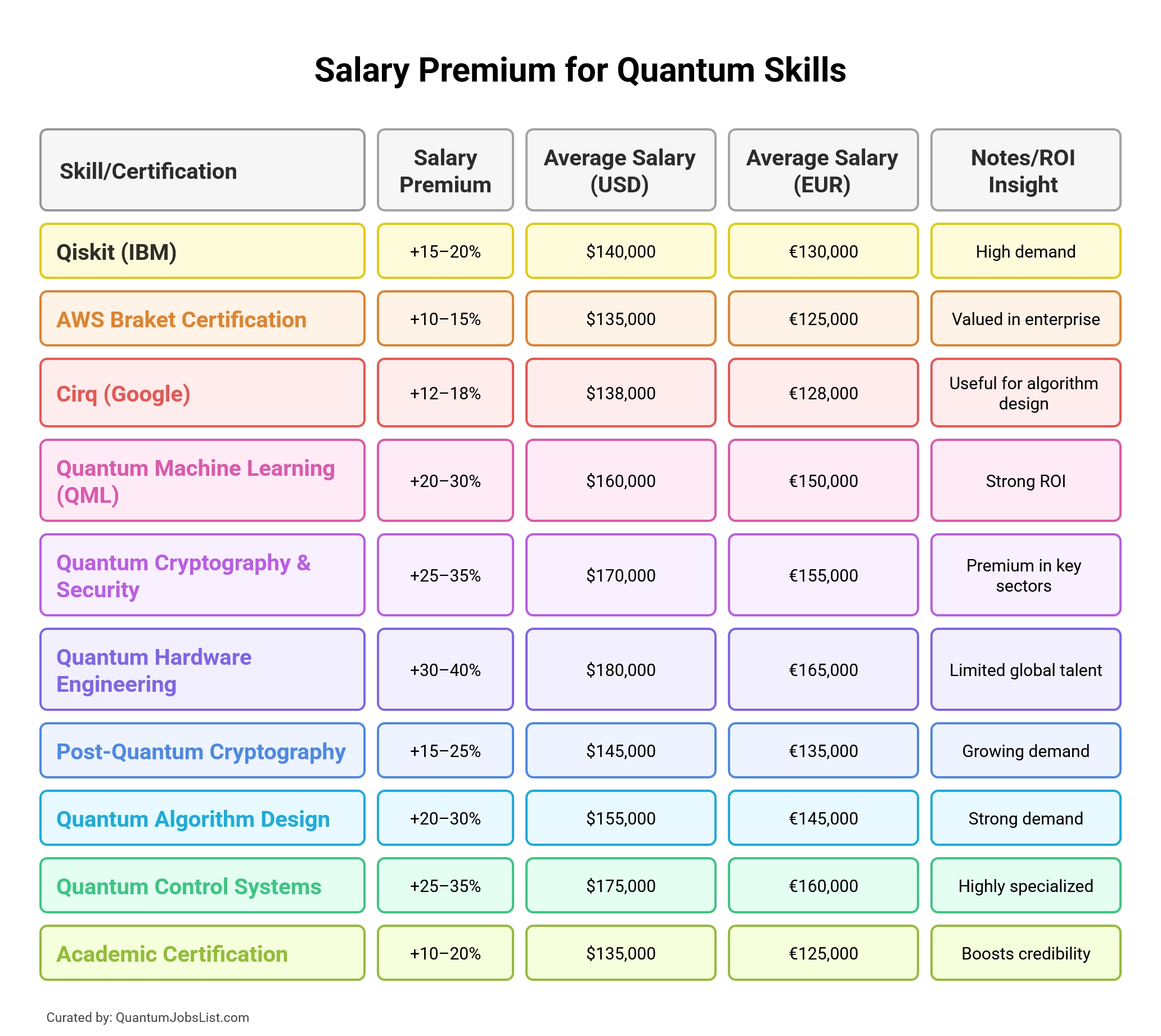12 Min. Read
Oct 24, 2025
Quantum Computing Jobs and Salaries: A Guide
Explore quantum computing job salaries worldwide. See how much engineers, researchers, and developers earn and what skills increase your pay.
Careers in quantum computing and technology are some of the highest-paid positions in the industry, with compensation 30-50% more than conventional software engineering jobs.
A projection of the market indicates that the quantum computing market will rise from $1.1 billion in 2024; to $5 billion by the year 2029. The relatively small pool of viable quantum specialists will sustain the rise in salary rates. MarketsandMarkets Quantum Salary Analysis
This guide analyzes more than 20 different quantum computing roles and their associated salaries. Entry-level positions begin at $80,000 and go all the way up to executive roles that are in excess of $500,000 on an annual basis. This will help you understand the compensation structure so that you can maximize your expected salary with the industry as your focus area, given the current quantum computing positions.
There are several different jobs, multiple levels of experience, and disparate geopolitical boundaries within the quantum computing industry. This means professionals from many sectors have the means to obtain highly compensated jobs. Considering this, we will analyze the earnings of quantum computing professionals.
What Are Quantum Computing Salaries: Market Reality
The economics of the quantum computing job market differ from other technology markets, creating unique market and wage dynamics.
Market Growth Driving Salary Increases
Salaries for beginner positions range from $80,000; while experts significantly higher on the earning scale bring home upwards of $300,000! Educational qualifications, skills possessed, and geographic location, coupled with the residing company, influence the figure greatly. Quantum Jobs USA Salary Report (2025)
The quantum industry's explosive growth creates multiple salary acceleration factors.For example, in the first half of 2024 alone, quantum venture companies have received more than $2.4B in venture capital. This is more than enough funding for quantum startups to begin competing for employees. Furthermore, established companies such as Google, IBM, and Microsoft invest billions in quantum computing, thus creating competition for employees.
Supply vs. Demand Dynamics
The primary reason for higher salaries in quantum computing, as well as other markets, is the shortage of skilled employees. Each year, the world produces around 3,000 PhDs in quantum computing, while the projected demand for quantum computing professionals in 2030 is over 100,000. This leads to the incredible 30:1 demand-to-supply ratio. Because of this, wages and salaries are greatly higher than in other markets. Because of this, there is an incredible demand for quantum-skilled professionals.
Unlike other technology sectors, quantum computing has more natural barriers to entry. This is because it requires knowledge of mathematics and physics, which takes a lot of time to acquire.
Average Salary Benchmarks Across Experience Levels
Accordint to the Glassdoor Quantum Computing Data (2025) reports, The average salary for a Quantum Computing is $181,491 per year in United States.
Current market data reveals distinct salary tiers based on experience and specialization:-
- Entry-Level (0-2 years):- $80,000-$120,000 a year
- Mid-Career (3-7 years):- $130,000-$200,000 a year
- Senior-Level (8+ years):- $180,000-$280,000 a year
- Executive/Leadership:- $250,000-$500,000+ a year
Comparison with Traditional Tech Salaries
Salaries in quantum computing are higher than in classical computing and higher than in most other fields in computing, too. Even the most junior quantum developers get paid 20-40% more than classical software engineers, while the most senior quantum developers get 50-70% more than software engineers.
This results not only from the difference in technical complexity, but also from the strategic value that quantum capabilities bring to the company's long-term prospects. Companies see quantum computing as a game changer in the quantum competitive landscape and are willing to pay a premium for professionals that can implement quantum solutions.

What Do Entry-Level Quantum Computing Jobs Pay?
Entry-level quantum positions offer exceptional starting compensation, that reflects the industry's urgent need for fresh talent and the specialized knowledge required even for junior roles.
Junior Developer and Research Roles ($80K-$120K)
Quantum Research Assistant:
At the more advanced levels, positions in academia and research can go for $80,000-110,000 a year, which is more than the average research position in academia. For these positions a bachelor’s in either of the following is required: physics, mathematics, and computer science. Having worked in quantum or having taken quantum focused courses is a definite bonus.
Junior Quantum Developers:
Jobs in tech companies and startups are paying even higher. According to the most recent statistics, these positions are paying $85,000-120,000. Major tech companies, such as IBM and Microsoft, frequently provide additional signing bonuses, stock options, and comprehensive benefits packages which raises the overall compensation by 20-30%.
Quantum Technical Writers:
These writer specializing in quantum documentation earn $70,000-95,000 initially; substantially higher than traditional technical writing roles. The quantum industry's complexity and need for clear communication creates premium demand for writers, who can explain quantum concepts effectively.
Technical Support and Documentation Positions
Quantum Test Technicians:
The salary for technicians who help in developing quantum hardware ranges from $75,000 - 105,000 a year. Those in the latter group have a foundational understanding of quantum systems, measurement, and the workings of various lab tools. Employees in these positions acquire hands-on experience with quantum hardware and are able to advance rapidly.
Quantum Data Analysts:
People in these positions also analyze research results and compute performance metrics for quantum systems, earning an initial salary of $80,000 - 115,000. The combination of expertise in quantum computing and statistical computing makes these positions appealing, especially to those who are shifting from data science.
Geographic Variations for New Graduates
Entry-level quantum jobs salaries vary significantly by location; with major quantum hubs commanding substantial premiums:-
- Silicon Valley:- Entry-level positions start 25-30% above national averages.
- Austin:- Growing quantum ecosystem with 5-10% above national averages.
- Boston/Cambridge:- MIT and Harvard proximity drives 15-20% salary premiums.
- Seattle:- Amazon and Microsoft presence creates competitive 10-15% premiums.
- Remote positions:- Often match local market rates of major quantum hubs.
Career Progression Timeline and Salary Growth
Entry-level quantum professionals typically experience rapid salary progression due to high demand and limited talent supply. Employers offer 15%-25% salary increases annually for the first three years.
With the industry maturing and the experience of quantum systems gaining practical value, compensation increases are greatly accelerated. Most quantum industry professionals achieve mid-career compensation within 2-3 years, a significant improvement over the 4-5 years standard in most other fields.
How Much Do Mid-Career Quantum Professionals Earn?
Mid-career quantum professionals with 3-7 years of experience command some of the highest compensation packages in technology. This is after reflecting their ability to bridge theoretical quantum knowledge with practical business applications.
Software Engineering and Development Roles ($130K-$180K)
Quantum Software Engineers:
These experienced engineers earn base salaries between $130,000 - 180,000, with total payment often exceeding $200,000 and 250,000 thanks to equity and bonuses. Most of these professionals manage the development of quantum algorithms, fine-tune quantum code to particular hardware, and oversee the work of less experienced developers.
Quantum Algorithm Developers:
Working in the Finance sector, algorithm application specialists earn between $120,000 - 180,000. These positions regularly incorporate performance bonuses directly related to algorithms, enhancing total compensation by 30 to 50%.
Quantum Applications Developers:
Compensation for these jobs averages between $115,000 - 165,000, with the greatest compensation going to those working in the healthcare and pharmaceutical industries. These industries greatly benefit quantum-enhanced drug discovery and molecular simulation; therefore, the compensation potential for quantum-accelerated applications is the highest.
Project Management and Business Roles
Quantum Project Managers:
Managers supervising complex quantum development projects can make between $120,000 to $170,000 every year. These positions attract experts with PMP qualifications and knowledge because they combine the art of technical understanding of quantum with sophisticated project management capabilities.
The position entails managing and coordinating quantum research, software development, and business integration teams. For this role, the ability to bridge and integrate the uniquely abstract technical quantum and business spheres is critical, making strong communication skills just as important as technical prowess.
Specialized Application Development Positions
Quantum Machine Learning Engineers:
Designing quantum-enhanced AI systems is at the top and entails some of the highest middle quantum career salaries, between $150,000-$200,000. To maintain those high salaries, the role with the highest demand requires cutting-edge knowledge of quantum algorithms and machine learning, which is extremely valuable and creates high entry barriers.
Suggested Read: Top Quantum ML Jobs and required skills
Quantum Cryptography Specialists:
Post-quantum security solution designers make between $140,000 -$220,000 yearly, including additional security clearance bonuses offered by the government and defense sectors. The high demand for these niche skills is due to the immediate and pressing need for quantum-safe cyber security.
Industry-Specific Salary Premiums
Different industries offer varying compensation premiums for quantum talent:-
- Financial Services:- 15-25% above tech industry averages due to potential trading and risk management applications
- Defense/Government:- 10-20% premiums plus security clearance bonuses and comprehensive benefits;
- Healthcare/Pharmaceuticals:- 20-30% premiums for drug discovery and molecular simulation applications;
- Consulting:- Variable compensation with potential for $200,000 - 300,000 including project bonuses

What Do Senior-Level and Executive Quantum Professionals Earn?
Senior quantum professionals represent the industry's most valuable talent, commanding compensation packages.This exceed traditional technology executive salaries, while requiring deep technical expertise combined with leadership abilities.
Principal Engineer and Architect Roles ($180K-$280K)
Principal Quantum Engineers:
Engineers at leading tech corporations make between $180,000 - 250,000, while total compensation reaches $300,000 - 400,000, including equity. Such employees usually spearhead quantum platform development, make foundational decisions about technical architectures, and represent their firms at industry conferences.
Quantum Architects:
For the design of enterprise quantum computing solutions, compensation ranges from $190,000 - 280,000 annually. These positions command a combination of significant quantum competency and knowledge of enterprise computing frameworks, making them vital for companies implementing quantum capabilities into enterprise systems.
The technical leadership responsibilities include; mentoring development teams, making strategic technology decisions and often contributing to quantum computing research publications that enhance their companies' industry reputation.
Research Scientist and PhD-Level Positions
Quantum Research Scientists:
Scientists at corporate research labs earn $160,000 - 220,000 base salaries, though total compensation including research bonuses & equity can reach $250,000 - 350,000. These roles typically require PhDs in physics or computer science; but offer opportunities to work on cutting-edge quantum research with commercial applications.
The most productive researchers can earn significant annual bonuses tied to innovation metrics and research impact. In addition to base salaries, research scientist positions come with additional compensation opportunities created by patent IP and other research publication bonuses.
Leadership and C-Suite Compensation ($250K-$500K+)
VP Quantum Engineering:
Positions at major corporations offer $250,000 - 400,000+ a year in total compensation packages. These executive roles combine technical leadership with business strategy; requiring deep quantum expertise plus proven ability to scale engineering organizations.
Quantum CTOs and Founders:
At successful quantum startups can earn $200,000 - 500,000+ a year. This is through combination of salary, equity, and performance bonuses. Early-stage quantum company equity can provide substantial upside, if companies achieve successful exits or IPOs.
Equity and Stock Option Considerations
Senior professionals in quantum companies can earn a significant portion of their compensation in the form of equity. In those cases the equity compensation can surpass cash salaries over the years. Public company stock options at Google, IBM, and Microsoft, and at quantum startups tend to have asymmetrical risk and reward, with the quantum startups being significantly riskier.
In quantum startups, senior technical leaders are typically offered equity in the range of 0.5%-5% of the company. Founding team members can occasionally receive stakes of 10% or more. Given the rapid growth of the quantum industry, early employees in successful quantum companies should expect equity to pay off in the future.
What are Quantum Computing Salaries by Geographic Location?
Geographic location significantly impacts quantum computing compensation; with certain regions commanding substantial premiums due to concentration of quantum companies, research institutions and competitive talent markets.
United States Regional Variations
The location factor continues to influence compensation, though remote work has narrowed some regional differences: Silicon Valley/San Francisco: Base salaries 15-20% above median · New York/Boston: Base salaries 10-15% above median. Developer Salary Report
Silicon Valley Premium (15-20% above median)
In the world of quantum computing, Silicon Valley continues to hold the title of the highest paying market. In that region, senior quantum software engineers can receive compensation that varies between $200,000-$300,000 and above. The intense competition to hire quantum talent in that region comes from quantum startups in the area, including Rigetti Computing, PsiQuantum, and IonQ.
To compete with other employers, large corporations such as Google, IBM, and Microsoft now offer significant quantum research and closely monitor compensation. These corporations face a unique challenge in the Bay Area of maintaining talent and paying high salaries to their employees due to the high cost-of-living.
New York/Boston Markets (10-15% above median)
The Boston/Cambridge area commands premium quantum salaries due to proximity to MIT, Harvard, and other research institutions. Quantum professionals have the unique opportunity to balance industry and academia, enhancing the flexibility and scope of their career advancement.
Thanks to New York's expanding quantum ecosystem tied to IBM's quantum network, applications in financial services, and other finance-related quantum innovation, salaries rise 10-15%. The abundance of financial institutions in the city that are interested in quantum computing for algorithmic trading, risk management, and other cogitative financial services creates lucrative employment opportunities.
Austin/Seattle/Chicago Markets
Austin's emerging quantum hub, supported by IBM's quantum network and growing startup ecosystem, offers competitive salaries with significantly lower cost of living. Austin also possesses a lower cost of living. Quantum professionals who service the Austin IBM quantum network and startups maintain the best purchasing power of all coastal quantum employment.
Seattle and Chicago are similarly positioned, but for different reasons. Chicago has quantum capabilities, thanks to the Chicago Quantum Exchange. Seattle benefits from Microsoft’s considerable investment in quantum computing capabilities and other services, in addition to the opportunities created by Amazon’s quantum cloud.
Remote Work Impact on Geographic Premiums
Remote work has partially democratized access to premium quantum salaries. Many companies offering location independent compensation for quantum roles. However, hardware focused positions typically require on-site presence, maintaining geographic salary variations. Many quantum companies adopt hybrid remote policies.
International Quantum Salary Comparisons
Canada (Toronto, Waterloo)
Canada's quantum sector, based around the Institute for Quantum Computing in Waterloo, along with its growing Toronto quantum companies, provides reasonably competitive salaries when adjusted for currency differences. Quantum computing professionals at the senior level in Canada earn around CAD $150,000 - $250,000, which is comparable to the mid-tier US markets.
Moreover, Canada also offers quantum computing specialists advantageous immigration positions among other skilled workers.
United Kingdom and Europe
The quantum sector in London offers senior quantum professionals a range between £80,000 - £150,000, and total compensation, including bonuses and equity, is approximately £200,000+. Since Brexit, London has encountered difficulty in recruiting talent, and this has resulted in salaries being more competitive due to the proximity to other European quantum hubs.
Salaries within Europe also differ based on the country, and while in Germany, France, and the Netherlands, around €80,000 - €140,000 is typical for experienced quantum professionals.
Asia-Pacific Markets (Australia, Singapore)
Australia offers a growing quantum ecosystem, which is being helped by government initiatives for quantum commercialization, providing senior quantum professionals with AUD $120,000 - $200,000. Investments in quantum research in Singapore offer opportunities for international quantum professionals looking to enter the Asia-Pacific region.
India and Emerging Markets
India's quantum sector offers competitive local salaries of ₹15-40 lakhs a year for quantum professionals, with international companies often providing additional benefits and equity participation. India’s growing quantum startup ecosystem creates opportunities for rapid career advancement & equity participation.
What are Quantum Salaries by Industry Sector?
Different industry sectors offer varying compensation structures and total rewards for quantum computing professionals. This is reflecting both the strategic importance of quantum capabilities & sector-specific budget realities.
Technology Companies (Google, IBM, Microsoft)
Major technology companies typically offer the most comprehensive quantum salary packages. This includes competitive base salaries, substantial equity participation, and extensive benefits. These companies view quantum computing as strategic competitive advantages, justifying premium talent investment.
- Google Quantum AI roles often include 15-25% annual bonuses tied to research milestones & publication goals;
- Microsoft Azure Quantum roles emphasize stock option packages, that provide long-term wealth building opportunities;
- IBM Quantum Network positions feature profit-sharing & patent bonuses for quantum innovation contributions.
Financial Services Premium Compensation
Many financial services firms that use quantum technology for services like portfolio optimization and algorithmic trading offer above-average salary premiums (20-30%) for the tech industry. Such salaries are justified when quantum algorithms are able to provide substantial trading benefits.
- Quantum trading algorithm developers at hedge funds can earn $200,000 - 400,000+ a year; including performance bonuses tied to algorithm profitability.
- Risk management quantum specialists help financial institutions prepare for quantum computing impacts on cryptographic security, earning $150,000 - 250,000 a year.
Defense and Government Contractor Salaries
With national security being one of the most sought-after and impactful fields in the country, quantum offers job stability and great pay, as well as the chance to work on revolutionary national security projects. With the supply of professionals being limited due to security clearance, there is even greater pay.
- Quantum cryptography specialists working on post-quantum security standards earn $140,000 - 220,000 a year, plus security clearance bonuses.
- Quantum sensing engineers developing quantum radar and navigation systems earn $130,000 - 190,000 a year, with long-term career stability.
Healthcare and Pharmaceutical Quantum Roles
As the use of quantum computing in the healthcare and pharmaceutical fields for drug development and molecular analysis is growing, so the salary. With the potential of quantum algorithms to target critical health areas, the expected compensation is substantial.
- Quantum molecular simulation specialists earn $150,000 - 200,000 a year, developing quantum algorithms for pharmaceutical research.
- Quantum machine learning engineers applying quantum computing to medical imaging & diagnosis earn $140,000 - 180,000 a year, plus potential royalty participation in successful applications.
Consulting and Professional Services
Quantum consulting roles offer variable compensation structures with significant upside potential based on project success and client value creation. It is not uncommon for veteran quantum consultants to make between $160,000 - 300,000 a year, incorporating all bonuses and profit share.
- Quantum strategy consultants help enterprises develop quantum adoption roadmaps. They are earning $180,000 - 250,000 a year with bonuses.
- Quantum implementation consultants supporting quantum technology deployment; can earn $200,000 - 300,000 a year, including success fees tied to project delivery.
Startup vs. Enterprise Compensation Models
Quantum startups typically offer lower base salaries. However lower salaries are compensated by substantial equity participation and rapid career advancement opportunities. Early-stage quantum company employees often receive 0.1% - 2% equity stakes that can provide substantial returns through successful exits.
Enterprise quantum roles emphasize salary stability, comprehensive benefits and steady career progression; While large companies provide quantum professionals with resources, mentorship & long-term career development opportunities, that many startups cannot match.

What are the Factors Influence Quantum Computing Salaries?
Multiple interconnected factors determine quantum computing compensation levels. This is creating complex salary dynamics that reward both technical expertise and strategic business value creation.
Educational Background Impact (Bachelor's vs. Master's vs. PhD)
Educational qualifications significantly influence quantum salary levels, though practical skills and experience often matter more than degree levels for many quantum roles.
Bachelor's degree holders:
Individuals strong in quantum programming, especially in quantum software development and applications, generally make between $95,000 and $165,000, depending on their experience and skills. With most companies, applied quantum skills rank higher than academic qualifications for most applied jobs.
Master's degree holders:
For most jobs, degree holders earn about a 10 to 20% salary premium over a professional with a bachelor’s degree. With salary expectations between $110,000 - $190,000, most advanced classes in quantum algorithms, quantum hardware, and quantum information theory will likely correlate to such estimates.
PhD holders:
These doctors, having a research-oriented position in applied development, will earn salaries between $140,000 - $220,000. However, the practical position pays more, and the difference in salary between the two positions is considerably fading away.
Technical Skills and Certifications Premium
Specific quantum technical skills command measurable salary premiums; with certain competencies creating substantial competitive advantages in salary negotiations.
Knowledge of a programming quantum language will earn 5 to 15% higher salaries, with Qiskit, Cirq, and Q# being the most in demand. Working on multiple quantum platforms will position a worker to earn 10 to 20% more as a result of decreased training and increased versatility.
Skills in quantum machine learning earn 15 to 25% higher salaries, and so does expertise in post-quantum cryptography, especially in the areas of defense and cybersecurity.
Industry Experience and Domain Knowledge
Professionals combining quantum expertise with domain knowledge in finance, healthcare, or cybersecurity often earn substantial salary premiums. This is reflecting their ability to identify and develop high-value quantum applications.
- Quantum + Finance professionals can earn 20 - 30% above pure quantum roles due to understanding of trading, risk management & financial modeling applications;
- Quantum + Healthcare specialists command similar premiums for drug discovery & medical imaging applications.
Suggested Read: Qualifications required for Quantum Jobs
Company Size and Funding Stage
The size of company and its financial capability affect quantum compensation levels. Different types of organizations come with their own pros and cons.
Big companies give predictable pay, steady career growth, and employee benefits. However, they provide compensation at market rates without great upward prospects. Startups provide much greater risk/reward opportunities, faster career growth, and substantial equity.
Quantum companies offer equity for defining new market applications, although they provide market compensation at this stage of their firm’s development.
Remote vs. On-Site Work Arrangements
Work arrangement flexibility influences quantum compensation; with different models offering various advantages for professionals and employers.
- Quantum software roles offer remote work opportunities with premium pay above the market salary for the role, regardless of where in the world the employee is located.
- Hybrid work involves the integration of quantum hardware and equity. Employees may adjust their lifestyles as research and development of the hardware expands and becomes more collaborative.
- On-site roles, like quantum research and development, offer equity in defining new market applications, although they provide market compensation at this stage of their firm’s development.
Quantum Programming Language Expertise
Proficiency in specific quantum programming languages & frameworks creates measurable salary differentiation in the quantum job market.
- Qiskit expertise provides the broadest job market access due to IBM's market presence & open-source adoption.
- Cirq proficiency offers advantages for Google Cloud quantum applications.
- Q# knowledge creates opportunities in Microsoft Azure Quantum ecosystem.
Multi-platform quantum programmers who can work across different quantum computing frameworks earn 10-15% higher salary.

How to Maximize Your Quantum job Salary?
Strategic career development and skill building can significantly increase quantum computing earning potential. With some approaches providing measurable salary returns on time & effort invested.
Strategic Skill Development for Higher Pay
Focusing skill development on high-value quantum competencies creates the fastest path to salary increases and career advancement opportunities.
Quantum machine learning is one of the most lucrative skill combinations because it merges quantum computing and AI. Those building competencies in quantum ML algorithms earn 20-30% higher salaries and gain access to superb research opportunities.
As organizations get ready for the importance of quantum computing on modern security frameworks, skills in post-quantum cryptography are becoming more and more essential. These skills, particularly in cryptography and cyber defense, command 15-25% salary premiums.
Creating and implementing cross-domain solutions that combine quantum skills and knowledge with other disciplines; such as finance, health care, or other optimization areas offers more extraordinary employer value and, thus, higher salary premiums. Quant business professionals find considerable value in the combination of quantum technology and business.
Suggested Read: Top Quantum Banking and Finance Jobs
Certification ROI and Salary Boosts
Quantum computing certifications provide credible skill validation & measurable salary increases, that often justify the time and cost investment.
- IBM Qiskit Developer Certification typically provides 8-15% salary increases. This enhance job market access. The certification shows practical quantum programming abilities that employers value;
- Microsoft Azure Quantum certifications create advantages for cloud-based quantum development roles & give access to Microsoft's quantum ecosystem opportunities;
- Google Cirq certifications offer similar benefits for Google Cloud quantum applications;
Multiple certifications can compound salary benefits. Professionals holding certifications across different quantum platforms often earning 15-20% premiums due to increased versatility & reduced training requirements.
Negotiation Strategies for Quantum Professionals
Experts in Quantum can take advantage of market needs and the lack of skills to negotiate lucrative salaries, that capture their importance to the organizations hiring them.
To negotiate an optimal salary, one must conduct thorough market rate research using several salary databases and industry reports. You can use competing offers as a negotiation strategy, especially in quantum computing, where demand, and therefore salary offers, can easily exceed the supply of qualified workers.
Focusing on total compensation, that is, the salary, equity, benefits, and professional development opportunities, can improve the value of a compensation package and save base salary increases for other negotiations. Focusing on potential business impact and the value of specific quantum skills in other projects will yield better negotiation outcomes than using vague target compensation.
Career Path Optimization for Salary Growth
Strategic career progression choices have a significant impact on long-term earning potential in quantum computing. This also gives professional development opportunities.
Technical leadership tracks leading to principal engineer or quantum architect roles provide paths to compensation levels of $200,000 - 300,000+ a year. Moreover, Management progression toward VP or CTO positions offers $250,000 - 500,000+ a year earning potential plus equity participation.
Entrepreneurial paths, such as founding a quantum startup or joining an early-stage company. These offer the highest upside potential through equity participation, albeit with a corresponding higher risk profile.
Cross-industry mobility between technology, finance, healthcare & consulting sectors allows professionals to leverage quantum skills. This can be done across different markets and compensation structures.
Building a Premium Quantum Portfolio
Professional portfolio development shows quantum competency. This also creates competitive edges in salary negotiations & career advancement opportunities.
- Open source contributions to major quantum computing projects provide visible evidence of technical skills & community engagement.
- Research publications & conference presentations establish professional reputation; This also helps you become a thought leader in quantum computing.
- Industry-specific applications showcasing quantum solutions for business problems, present practical value creation beyond theoretical knowledge.
- Mentorship & teaching activities establish a professional reputation; This often leads to consulting and advisory opportunities with additional compensation.
Are quantum computing jobs in demand in 2026 and beyond?
Yes, demand for quantum computing professionals is growing faster than supply.
According to Deloitte & McKinsey reports, the global quantum workforce shortage will exceed 10,000 skilled roles by 2026-27.
- Industries like finance, healthcare, and cybersecurity are already hiring quantum engineers & algorithm developers;
- Companies such as IBM, Google, Amazon and IonQ are scaling commercial quantum projects, raising salaries & competition;
- Startups and research labs are also investing heavily in applied quantum applications, making it one of the most promising career fields through 2030.
Which industries pay the most for quantum computing talent?
Industries that pay the highest for quantum professionals include finance, defense and cloud technology.
- Financial services firms pay premium salaries ($180,000-300,000 a year) for quantum optimization & cryptography experts.
- Pharmaceutical and materials science companies are also growing fast. These are offering six-figure packages for quantum chemists and simulation experts;
- Defense and aerospace companies offer competitive pay for secure communication & quantum sensing roles;
- Cloud providers like AWS, Microsoft and Google lead in compensation for quantum platform engineers & researchers.
The rising investment in these industries reflects how quantum computing is moving from theory to real-world impact, driving both demand & salary growth.
Conclusion
The quantum computing sector offers outstanding income prospects, with an initial starting salary of around $80,000, while upper management earns more than $500,000 annually. This high compensation reflects the rapid growth the sector has experienced, as well as the shortage of qualified professionals. As quantum technology transitions from the research phase to the commercial phase, the value of combining theoretical and practical business application expertise is becoming increasingly valuable.
In quantum computing, career opportunities arise from developing and enhancing skills, geographical location, industry sector, and effective career planning. If you are improving and optimizing your position, the financial incentives in this field are considerable. Take the opportunity and start developing your skills to qualify for this profitable field.
Suggested Read:
FAQs
Do you need a PhD to earn high quantum computing salaries?
A PhD helps in research or academic roles. it’s not mandatory for high-paying industry jobs. Many developers with bachelor’s or master’s degrees earn six-figure salaries in the US, UK and EU. Employers prioritize technical skills, innovation & real-world project experience.
How much do quantum computing jobs pay?
Quantum computing salaries are among the highest in tech worldwide. Entry-level professionals earn $80,000 - $120,000 a year in the US, while £60,000 - £90,000 a year in the UK, and €70,000 - €110,000 in the EU. Senior engineers and researchers can make $200,000 - $300,000+, depending on experience and region.
What is the highest paying quantum computing job?
Executive positions like Quantum CTOs, Directors and Founders earn the most, often exceeding $400,000 globally. Principal Quantum Engineers and Consultants typically make $180,000 - $300,000 a year. In Europe and the UK, top experts earn €150,000 – €250,000+ in leading firms and labs.
How do quantum computing salaries compare by location?
Salaries vary by region and cost of living. The US and Switzerland lead with the highest pay, followed by the UK, Germany, and Canada. Remote roles are growing globally. This is helping skilled professionals earn competitive salaries regardless of their country or location.
How fast do quantum computing salaries grow with experience?
Quantum salaries rise quickly due to limited global talent. Specialists often see 15–25% annual growth in early career years. Within a decade, experienced experts can double or triple their earnings; especially in rapidly growing markets like the US, UK and Europe.
What factors affect quantum computing salary the most?
Salary depends on experience, specialization, and industry demand. Positions in quantum cryptography, machine learning, and materials simulation pay the highest. Company type also matters. Large tech companies, finance, and defense sectors usually offer better compensation worldwide.








.svg)